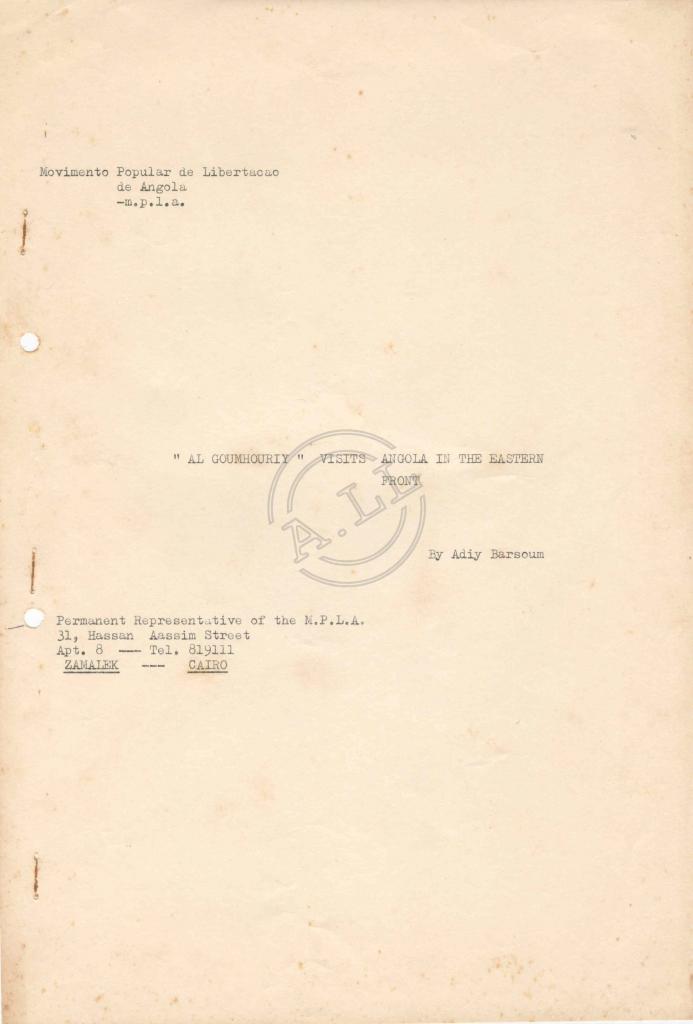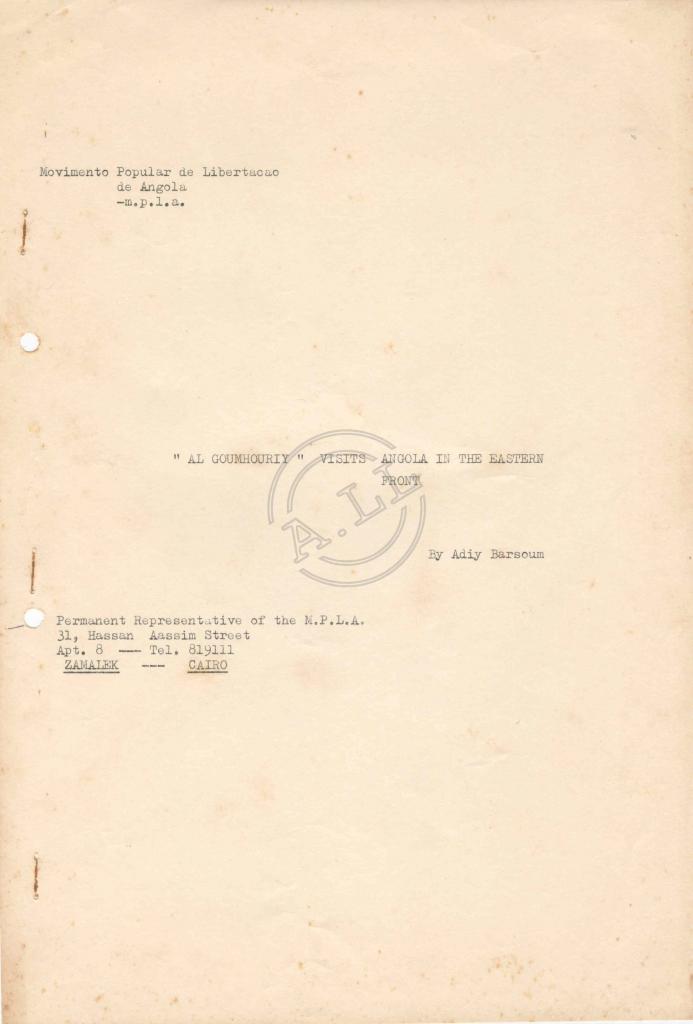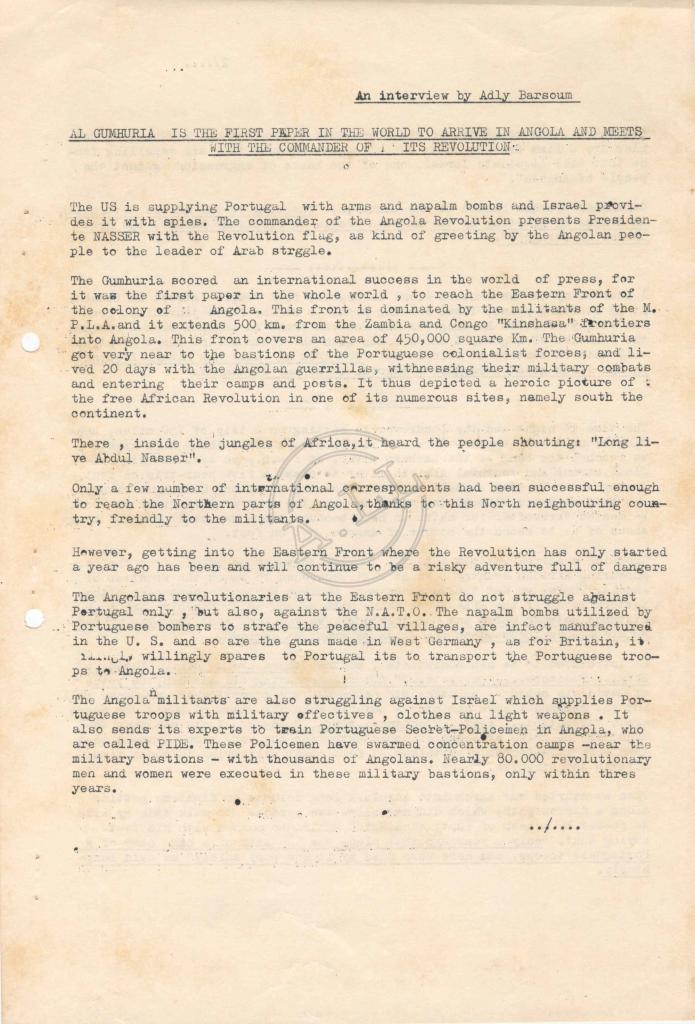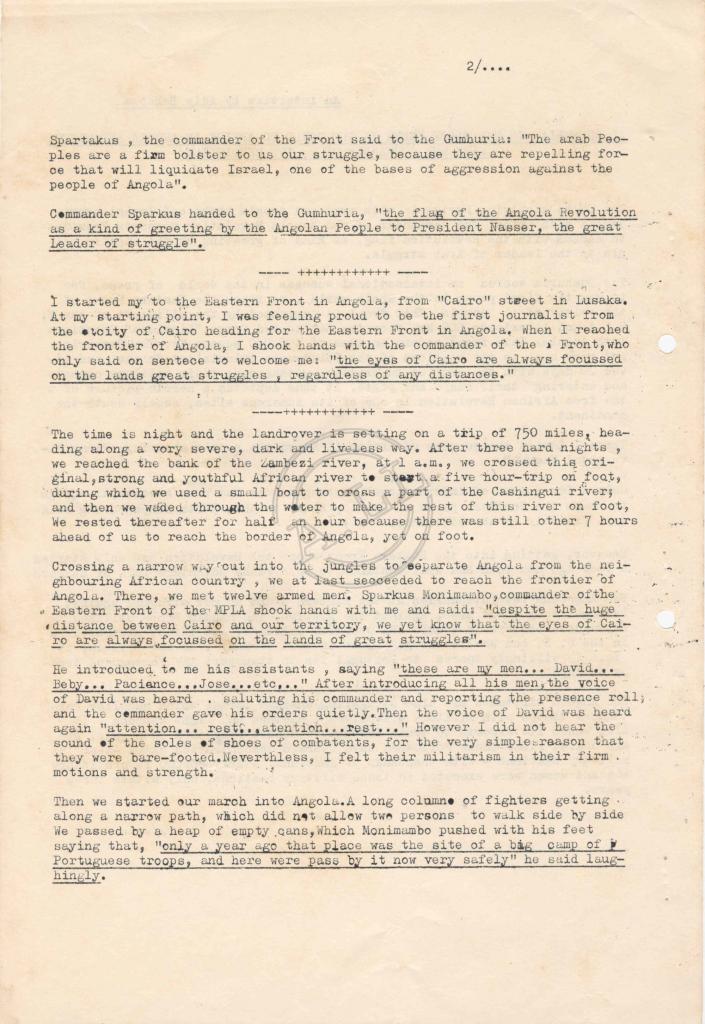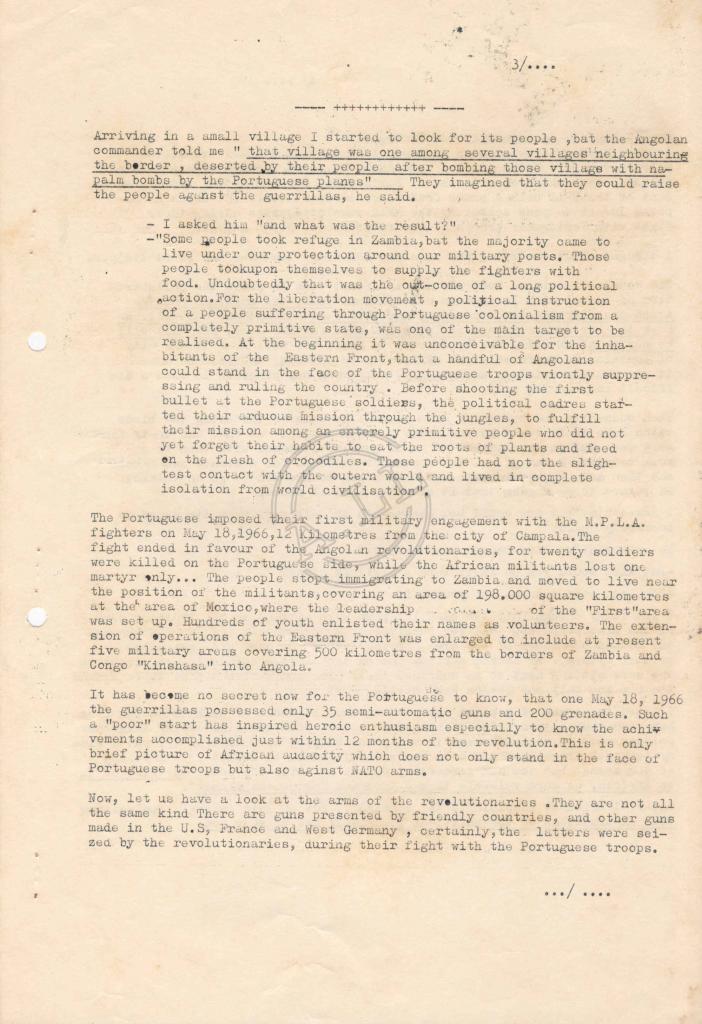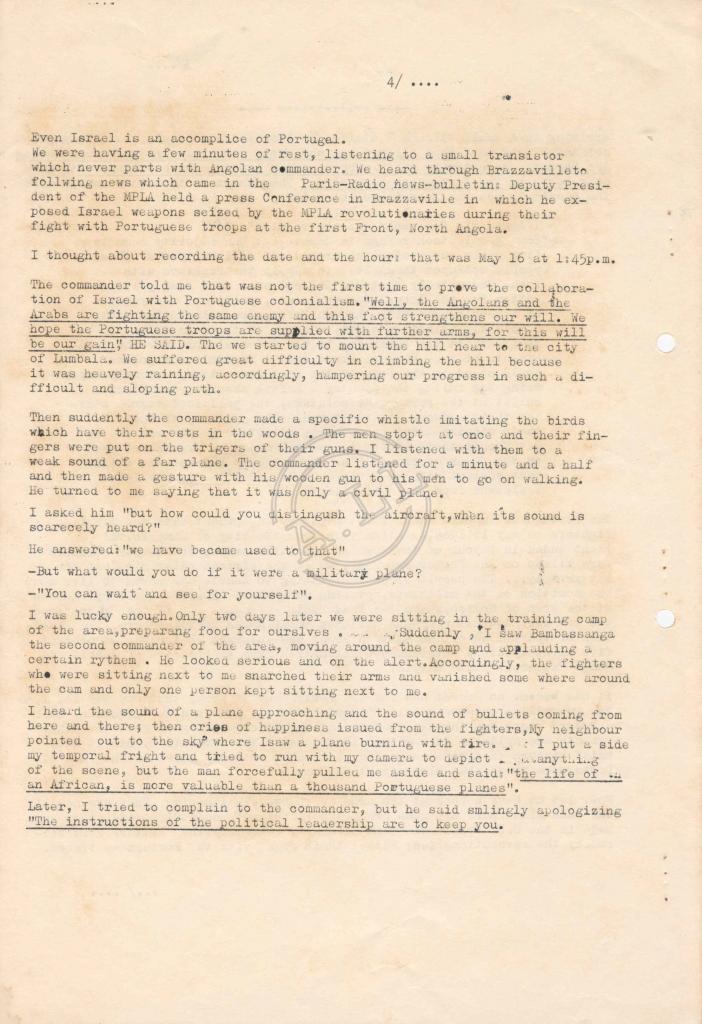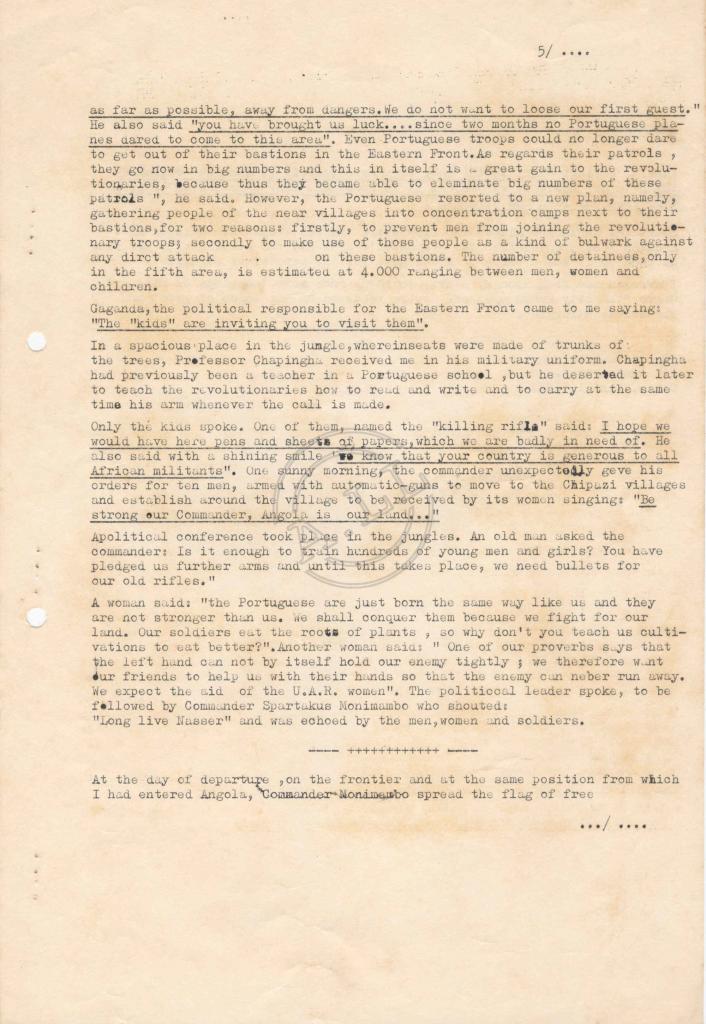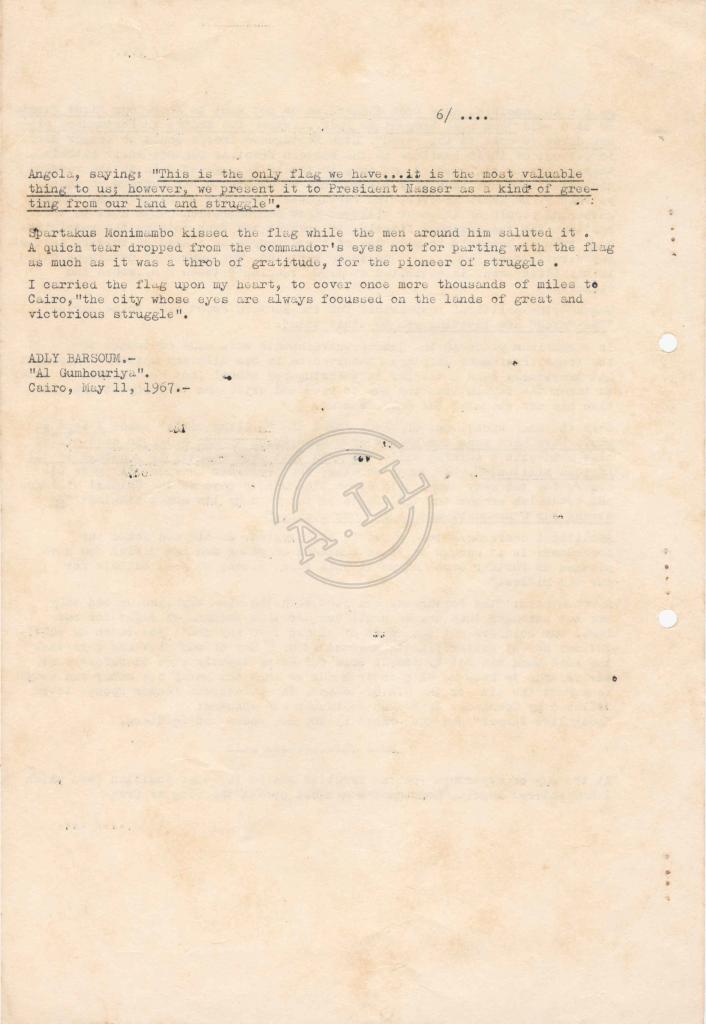Cota
0093.000.013
Tipologia
Entrevista
Impressão
Policopiado
Suporte
Papel Comum
Autor
Adly Barsoum
Data
Idioma
Conservação
Bom
Fundo
Imagens
7
Acesso
Público
Movimento Popular de Libertação de Angola
m. p. l. a.
“AL GOUMHOURIY” VISITS ANGOLA IN THE EASTERN
FRONT
By Adly Barsoum
Permanent Representative of the M.P.L.A.
31, Hassan Aassim Street
Apt. 8 ---- Tel. 819111
ZAMALEK ----- CAIRO
An interview by Adly Barsoum
AL GUMHURIA IS THE FIRST PAPER IN THE WORLD TO ARRIVE IN ANGOLA AND MEET WITH THE COMMANDER OF ITS REVOLUTION
The US is supplying Portugal with arms and napalm bombs and Israel provides it with spies. The commander of the Angolan Revolution presents Presidente Nasser with the Revolution flag, as kind of greeting by the Angolan people to the leader of Arab struggle.
The Gumhuria scored an international success in the world of press, for it was the first paper in the whole world, to reach the Eastern Front of the colony of Angola. This front is dominated by the militants of the M.P.L.A. and it extends 500km. from the Zambia and Congo “Kinshasa” frontiers into Angola. This front covers an area of 450,000 square km. The Gumhuria got very near to the bastions of the Portuguese colonialist forces; and lived 20 days with the Angolan guerrillas, witnessing their military combats and entering their camps and posts. It thus depicted a heroic picture of the free African Revolution in one of its numerous sites, namely south the continent.
There, inside the jungle of Africa, it heard the people shouting: “Long live Abdul Nasser”.
Only a few number if international correspondents had been successful enough to reach the Northern parts of Angola, thanks to his North neighbouring country, friendly to the militants.
However, getting into the Eastern Front where the Revolution has only started a year ago has been and will continue to be a risky adventure full of dangers.
The Angolans revolutionaries at the Eastern Front do not struggle against Portugal only, but also, against the N.A.T.O. The napalm bombs utilized by Portuguese bombers to strafe the peaceful villages, are in fact manufactured in the U.S. and so are the guns in West Germany, as for Britain, (indistinct), willingly spares to Portugal its to transport the Portuguese troops to Angola.
The Angolan militants are also struggling against Israel which supplies Portuguese troops with military effectives, clothes and light weapons. It also sends its experts to train Portuguese Secret-Policemen in Angola, who are called PIDE. The Policemen have swarmed concentration camps - near the military bastions - with thousands of Angolans. Nearly 80.000 revolutionary men and women were executed in these military bastions, only within three years.
Spartakus, the commander of the Front said to the Gumhuria: “The arab Peoples are a firm bolster to us our struggle, because they are a repelling force that will liquidate Israel, one of the bases of aggression against the people of Angola”.
Commander Spartakus handed to the Gumhuria, “the flag of the Angola Revolution as a kind of greeting by the Angolan people to President Nasser, the great Leader of struggle”.
I started my to the Eastern Front in Angola, from “Cairo” street in Lusaka. At my starting point, I was feeling proud to be the first journalist from the city of Cairo heading for the Eastern Front in Angola. When I reached the frontier of Angola, I shook hands with the commander of the Front, who only said one sentence to welcome me: “the eyes of Cairo are always focused on the land’s great struggles, regardless of any distances.”
The time is night and the landrover is setting on a trip of 750 miles, heading along a very severe, dark and lifeless way. After three hard nights, we reached the bank of the Zambezi river, at 1 a.m, we crossed this original, strong and youthful African river to start a five hour-trip on foot, during which we used a small boat to cross a part of the Cashingui river; and then we waded through the water to make the rest of this river on foot, we rested thereafter for half an hour because there was still other 7 hours ahead of us to reach the border of Angola, yet on foot.
Crossing a narrow way out into the jungles to separate Angola from the neighbouring African country, we at last succeeded to reach the frontier of Angola. There, we met twelve armed men. Spartakus Monimambo, commander of the Eastern Front of the MPLA shook hands with me and said: “despite the huge distance between Cairo and our territory, we yet know that the eyes of Cairo are always focused on the lands of great struggles”.
He introduced to me his assistants, saying “these are my men... David...Beby...Paciance...Jose...etc...” After introducing all his men, the voice of David was heard saluting his commander and reporting the presence roll, and the commander gave his orders quietly. Then the voice of David was heard again “attention... rest... attention... rest...” However I did not hear the sound of the soles of shoes of combatants, for the very simple reason that they were bare-footed. Nevertheless, I felt their militarism in their firm motion and strength
Then we started our march into Angola. A long column of fighters getting along a narrow path, which did not allow two persons to walk side by side we passed by a heap of empty cans, which Monimambo pushed with his feet saying that, “only a year ago that place was the site of a big camp of Portuguese troops, and here were pass by it now very safely” he said laughingly.
Arriving in a small village I started to look for its people, but the Angolan commander told me “that village was one among several villages neighbouring the boarder, deserted by their people after bombing those villages with napalm bombs by the Portuguese planes” They imagined that they could raise the people against the guerrillas, he said.
- I asked him “and what was the result?”
- “Some people took refuge in Zambia, but the majority came to live under our protection around our military posts. Those people took upon themselves to supply the fighters with food. Undoubtedly that was the out-com of a long political action. For the liberation movement, political instruction of people suffering through Portuguese colonialism from a completely primitive state, was one of the main target to be realized. At the beginning it was inconceivable for the inhabitants of the Eastern Front, that a handful of Angolans could stand in the face of the Portuguese troops violently suppressing and ruling the country. Before shooting the first bullet at the Portuguese soldiers, the political cadres started their arduous mission through the jungles, to fulfil their mission among an entirely primitive people who did not yet forget their habits to eat the roots of plants and feed on the flesh of crocodiles. Those people had not the slightest contact with the outer world and lived in complete isolation from world civilization”.
The Portuguese imposed their first military engagement with the M.P.L.A. fighters on May 18, 1966, 12 kilometers from the city of Campala. The fight ended in favour of the Angolan revolutionaries, fro twenty soldiers were killed on the Portuguese side, while the African militants lost one martyr only... The people stopped imigrating to Zambia and moved to live near the position of the militants, covering an area of 198.000 square kilometers at the area of Moxico, where the leadership of the “First” area was set up. Hundreds of youth enlisted their names as volunteers. The extension of operations of the Eastern Front was enlarged to include at present five military covering 500 kilometers from the boarders of Zambia and Congo “Kinshasa” into Angola.
It has become no secret now for the Portuguese to know, that on May 18, 1966 the guerrillas possessed only 35 semi-automatic guns and 200 grenades. Such a “poor” start has inspired heroic enthusiasm especially to know the achievements accomplished just within 12 months of the revolution. This is only a brief picture of African audacity which does not only stand in the face of Portuguese troops but also against NATO arms.
Now, let us have a look at the arms of the revolutionaries. They are not all the same kind, there are guns presented by friendly countries, and other guns made in the U.S, France and West Germany, certainly, the latters were seized by the revolutionaries, during their fight with the Portuguese troops.
Even Israel is an accomplice of Portugal.
We were having a few minutes of rest, listening to a small transistor which never parts with Angolan commander. We heard through Brazzaville the following news which came in the Paris-Radio news bulletin: Deputy President of the MPLA held a press Conference in Brazzaville in which he exposed Israel weapons seized by the MPLA Revolutionaries during their fight with Portuguese troops at the first Front, North Angola.
I thought about recording the date and the hour: that was May 16 at 1:45 p.m.
The commander told me that was not the first time to prove the collaboration of Israel with Portuguese colonialism. “Well, the Angolans and the Arabs are fighting the same enemy and this fact strengthens our will. We hope the Portuguese troops are supplied with further arms, for this will be our gain” HE SAID. Then we started to mount the hill near to the city of Lumbala. We suffered great difficulty in climbing the hill because it was heavily raining, accordingly, hampering our progress in such a difficult and sloping path.
Then suddenly the commander made a specific whistle imitating the birds which have their rests in the woods. The men stopped at once and their fingers were put on the trigger of their guns. I listened with them to a weak sound of a far plane. The commander listened for a minute and a half and then made a gesture with this wooden gun to his men to go on walking. He turned to me saying it was only a civil plane.
I asked him “but how you distinguish the aircraft, when it sound is scarcely heard?”
He answered: “We have become used to that”
- But what would you do if it were a military plane?
- “You can wait and see for yourself”.
I was lucky enough. Only two days later we were sitting in the training camp of the area, preparing food for ourselves. Suddenly, I saw Bambassanga the second commander of the area, moving around the camp and applauding a certain rhythm. He looked serious and on alert. Accordingly, the fighters who were sitting next to me snatched their arms and vanished somewhere around the cam and only one person kept sitting next to me.
I heard the sound of a plane approaching and the sound of bullets coming from here and there, then cries of happiness issued from the fighters. My neighbour pointed out to the sky where I saw a plane burning with fire. I put a side my temporal fright and tried to run with my camera to depict anything of the scene, but the man forcefully pulled my aside and said: “the life of an African, is more valuable than a thousand Portuguese planes”.
Later, I tried to complain to the commander, but he said seemingly apologizing “The instructions of the political leadership are to keep you as far as possible, away from dangers. We do not want to loose our first guest.” He also said “you have brought us luck... since two months no Portuguese planes dared to come to this area”. Even Portuguese troops could no longer dare to get out of their bastion in the Eastern Front. As regards their patrols, they go now in big numbers and this in itself is a great gain to the revolutionaries, because thus they became able to eliminate big numbers of these patrols”, he said. However, the Portuguese resorted to a new plan, namely, gathering people of the near villages into concentration camps next to their bastions, for two reasons: firstly, to prevent men from joining the revolutionary troops; secondly to make use of those people as a kind of bulwark against any direct attack on these bastions. The number of the detainees, only in the fifth are, is estimated at 4.000 ranging between men, women and children.
Gaganda, the political responsible for the Eastern Front came to me saying: “The “kids” are inviting you to visit them”.
In a spacious plane in the jungle, where instead were made of trunks of the trees, Professor Chapingha received me in his military uniform. Chapingha had previously been a teacher in a Portuguese school, but he deserted it later to teach the revolutionaries how to read and write and to carry at the same time his arm whenever the call is made.
Only the kids spoke. One of them, named the “killing rifle” said: I hope we would have here pens and sheets of papers, which we are badly in need of. He also said with a shining smile “we know that your country is generous to all African militants”. One sunny morning, the commander unexpectedly gave his orders for ten men, armed with automatic-guns to move to the Chipazi villages and establish around the village to be received by its women singing: “Be strong our commander, Angola is our land...”
A political conference took place in the jungles. An old man asked the commander: Is it enough to train hundreds of young men and girls? You have pledged us further arms and until this takes place, we need bullets for our old rifles.”
A woman said: “the Portuguese are just born the same way like us and they are not stronger than us. We shall conquer them because we fight for our land. Our soldiers eat the roots of plants, so why don’t you teach us cultivations to eat better? Another woman said: “One of our proverbs says that the left hand cannot by itself hold our enemy tightly; we therefore want our friends to help us with their hands so that the enemy can never run away. We expect the aid of the U.A.R. women”. The political leader spoke, to be followed by Commander Spartakus Monimambo who shouted:
“Long live Nasser” and was echoed by the men, women and soldiers.
At the day departure, on frontier and at the same position from which I had entered Angola, “Commander Monimambo” spread the flag of Angola, saying: “This is the only flag we have... it is the most valuable thig to us however, we present it to President Nasser as a kind of greeting from our land and struggle”.
Spartakus Monimambo kissed the flag while the men around his saluted it. A quick tear dropped from the commander’s eyes not for parting with the flag as much as it was a throb of gratitude, for the pioneer of struggle.
I carried the flag upon my heart, to cover once more thousands of miles to Cairo, “the city whose eyes are always focused on the lands of great and victorious struggle”.
ADLY BARSOUM.-
“Al Gumhouriya”.
Cairo, May 11, 1967.-
«Al Goumhouriy visits Angola in the Eastern Front», entrevista de Adly Barsoum (Cairo).
A publicação, total ou parcial, deste documento exige prévia autorização da entidade detentora.
